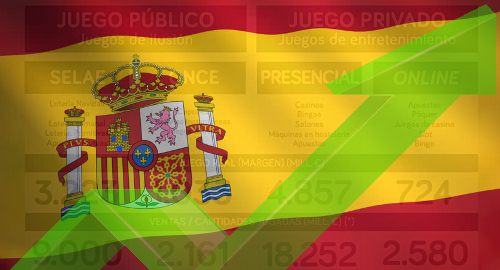 Spain’s gambling sector continues to grow but has yet to regain the heights it hit prior to the 2008 global economic meltdown.
Spain’s gambling sector continues to grow but has yet to regain the heights it hit prior to the 2008 global economic meltdown.
On Thursday, the Consejo Empresarial del Juego (CEJUEGO) industry body released its 2019 Gaming in Spain Yearbook (viewable here, en español), which actually covers figures for 2018, but whatcha gonna do.
The report claims Spain’s gambling market was worth €9.87b in 2018, representing 0.8% of the nation’s gross domestic product. That sum represents a 5% improvement over 2017’s result, and marks the fourth consecutive year of annual growth, but it’s still 15.6% below 2007’s pre-recession peak of €11.7b.
(This phenomenon isn’t limited to Spain. Even Nevada’s mighty casino sector has yet to regain its pre-recession form, as 2018’s total revenue was nearly $1b below its 2007 peak.)
The private sector’s share of 2018’s bounty was €5.58b, up 4.2% from 2017. The public sector – consisting of the SELAE and ONCE lotteries – was up a more modest 1.9% year-on-year to €4.29b. However, the public sector has suffered a much smaller decline (-9.9%) since 2007 than the private sector (-19.6%).
Spanish-licensed online gambling was worth €724.4m in 2018, up nearly one-quarter from 2017. However, that represents a slower growth rate than the previous two years— +30.8% in 2017 and +34.4% in 2016 – according to figures compiled by Spain’s Dirección General de Ordenación del Juego (DGOJ) regulatory body.
Spain’s government collected tax revenue of €1.34b from gambling in 2018, while the gaming industry employed 85,047 Spanish residents, 55.4% of which were employed by the private sector.
Spanish gambling operators spent €412m on advertising in 2018, a subject that has become more delicate over the past year. Spain will hold general elections on November 10 and various parties have publicly mused about imposing a tobacco-style prohibition on gambling marketing.
On a more positive note, Cejuego reminded readers that previous research showed Spain’s pathological gambling rate at a miniscule 0.3%, tying Norway for lowest among European markets. Cejuego general director Alejandro Landaluce said the data was “good, but we want to keep improving.”